Meltdown & Spectre: Analyzing Performance Impacts on Intel's NUC7i7BNH
by Ganesh T S on March 23, 2018 4:15 PM EST- Posted in
- Systems
- Spectre
- Benchmarks
- Meltdown
Miscellaneous Benchmarks
CINEBENCH R15 is our benchmark of choice for 3D rendering. It provides three benchmark modes - OpenGL, single threaded and multi-threaded. This benchmark is largely unaffected by the patching. All the recorded numbers are within the margin of expected errors from one run to another.
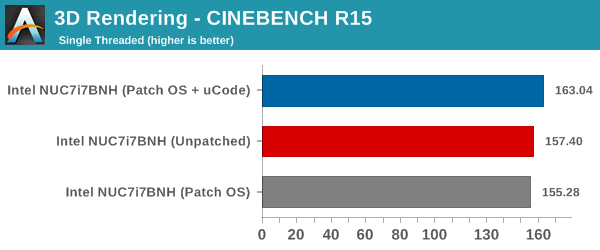
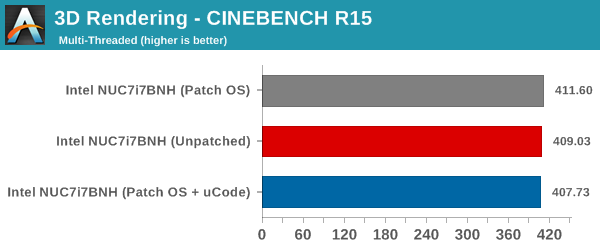
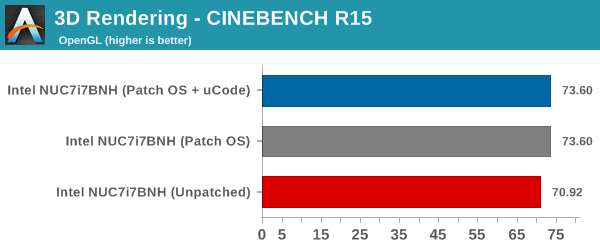
x264 v5.0 is another benchmark that is unaffected by the Meltdown and Spectre patches.
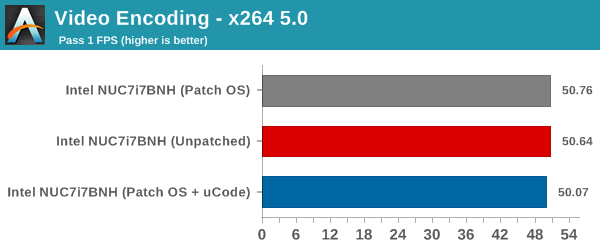
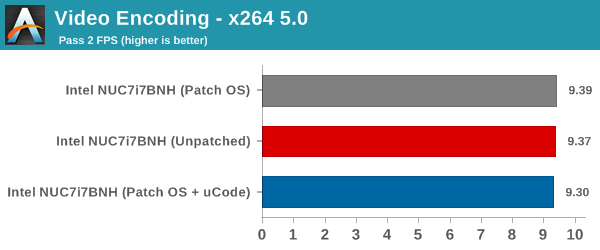
7-Zip is a very effective and efficient compression program, often beating out OpenCL accelerated commercial programs in benchmarks even while using just the CPU power. 7-Zip has a benchmarking program that provides tons of details regarding the underlying CPU's efficiency. In our benchmark suite, we are interested in the compression and decompression MIPS ratings when utilizing all the available threads. This benchmark also remains unaffected, with the results happening to be within the margin of error from run to run.
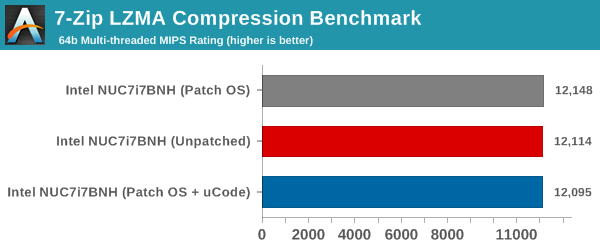
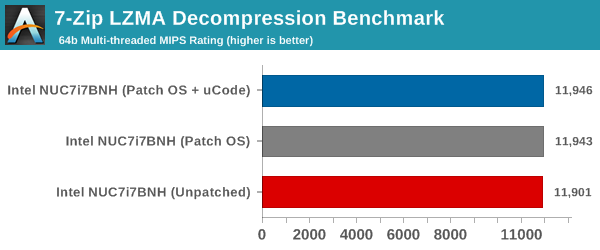
Agisoft PhotoScan is a commercial program that converts 2D images into 3D point maps, meshes and textures. The program designers sent us a command line version in order to evaluate the efficiency of various systems that go under our review scanner. The command line version has two benchmark modes, one using the CPU and the other using both the CPU and GPU (via OpenCL). We have been using an old version of the program with 50 photographs in our reviews till now. The updated benchmark (v1.3) now takes around 84 photographs and does four stages of computation:
- Stage 1: Align Photographs (capable of OpenCL acceleration)
- Stage 2: Build Point Cloud (capable of OpenCL acceleration)
- Stage 3: Build Mesh
- Stage 4: Build Textures
We record the time taken for each stage. Since various elements of the software are single threaded, others multithreaded, and some use GPUs, it is a very relevant benchmark from a media editing and content creation perspective.
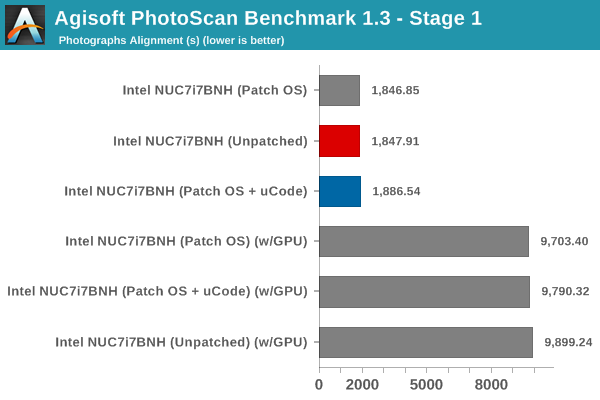
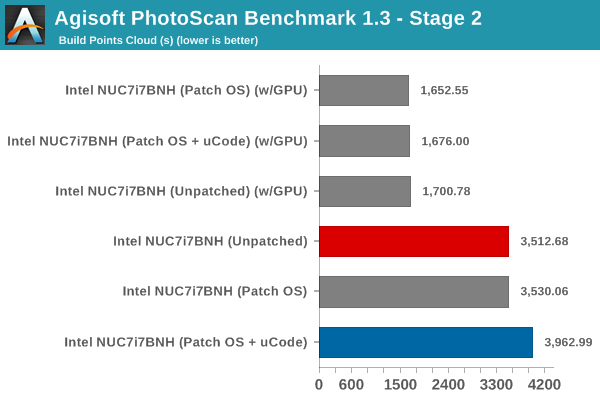
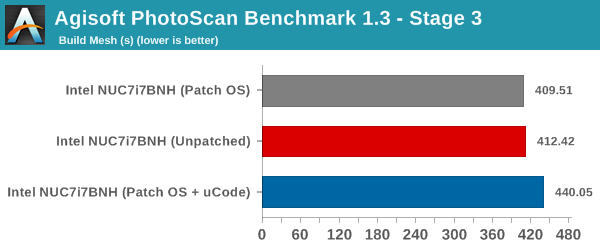
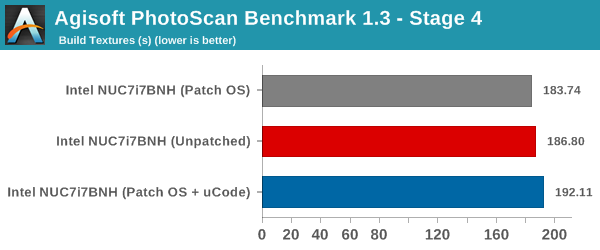
Since this is a real-world benchmark, we can see performance impacts in some of the stages. While the first and last ones do not have any significant deviation, stages 2 and 3 are worse off by around 12.8% and 6.8% respectively in the non-GPU case.
The benchmarks section wraps up with the new Dolphin Emulator (v5) benchmark mode results. This is again a test of the CPU capabilities, but, we don't see much impact on the performance from the patching. The bennchmark consistently took around 325 seconds in all three patching configurations.










83 Comments
View All Comments
Samus - Saturday, March 24, 2018 - link
It isn't a bug, or a design flaw. It's just an exploit of the architecture.Saying otherwise is like saying houses not built for category 3 hurricanes in New York have a design flaw when the area has never needed construction to that spec. But with climate change, the need is becoming necessary as the architecture is no longer fit for the climate.
Not a great analogy, but in the same example, neither Intel nor construction designers anticipated the architecture would become flawed due to unforeseen circumstances.
Alexvrb - Saturday, March 24, 2018 - link
It's definitely a flaw. Unintentional security flaws are still flaws. It's an exploit of a security flaw in the architecture. They'll release a CPU in the future which still have speculative execution and isn't vulnerable to this flaw, at an architecture level. It might have other flaws, however. CPU flaws, bugs, errata are very common.HStewart - Saturday, March 24, 2018 - link
"It isn't a bug, or a design flaw. It's just an exploit of the architecture."It is attempt to distract on Intel productions, that also back fire because it also effects ARM and AMD.
bji - Sunday, March 25, 2018 - link
That's not really true. There is a class of very hard to exploit design flaws in most implementations of speculative execution that seem to be systemic to almost all chips, that is true. These are so hard to exploit as to be nearly unexploitable in my opinion. These are called Spectre.But there is also a much more significant and easy to exploit design flaw. This affects only Intel chips (and I guess some ARM chips too -- but not AMD). This is called Meltdown.
So there is no distracting going on here. Almost all chips are affected by spectre, but it's so hard to exploit as to almost be irrelevant. Meltdown is serious and it's Intel only.
Manch - Monday, March 26, 2018 - link
HStewart is an Intel shill/fan boy. In his mind Intel can do no wrong. You're wasting your breath arguing with him.bcronce - Sunday, March 25, 2018 - link
A bug is when something does not work to spec.boozed - Sunday, March 25, 2018 - link
I bet you $10 the spec doesn't say "our branch prediction should have this massive security flaw".linuxgeex - Monday, March 26, 2018 - link
Correct, it's a design flaw not a bug. When something operates as designed it isn't a bug, but that doesn't make it correct either. Intel is rightly getting sued by the people who are significantly affected and who can afford to battle Intel in court... that will be people who forked over millions to obtain small performance improvements based on Intel's claims of security, performance, and fitness for the purpose for which it was sold, which later was found to be false. They are being sued exactly the same way that Honda would be sued if they supplied a Formula One team with an engine that performed 30% slower than advertised.Alexvrb - Saturday, March 24, 2018 - link
It's a CPU vulnerability.willis936 - Friday, March 23, 2018 - link
The power consumption drop with performance is interesting. I'd be interested in seeing a comparison of efficiency pre and post patch. At a glance t's difficult to tell if efficiency has gone up, down, or stayed the same. I'm under the impression that this patch disables speculative execution entirely which, unless speculation takes a lot more power than I think, efficiency should go down.